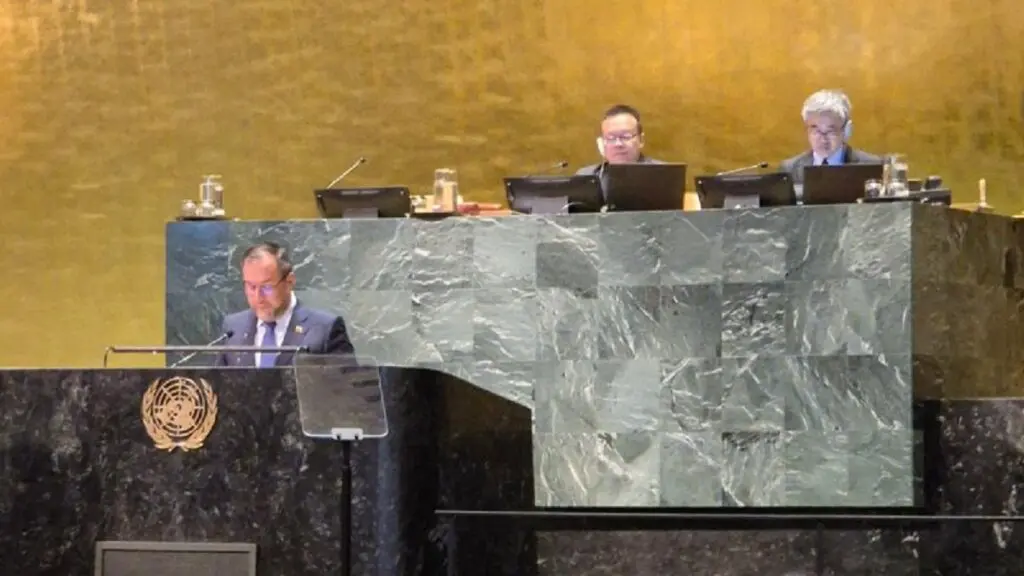
The Venezuelan foreign minister denounced the U.S. attempt to strip his country of the company Citgo Petroleum Corporation, the main Venezuelan asset in the northern nation and legitimate heritage of the people heir to Bolívar and Chávez. Photo: VTV
United Nations, June 13 (RHC)-- The Foreign Minister of Venezuela, Yván Gil, urged this Thursday before the United Nations General Assembly to put an end to all unilateral coercive measures (MCU) applied by powerful nations against developing States, which he considered illegal and crimes. against humanity because they represent a violation of the basic human rights of entire populations.
When speaking before the plenary session on the agenda dedicated to the analysis and rejection of these forms of collective punishment, the diplomat described as failed the pressure measures that more than ten US Administrations have maintained against Cuba for more than 60 years. He demanded that Washington withdraw them and remove the largest of the Antilles from the unilateral list of States that sponsor terrorism.
The Venezuelan foreign minister recalled that more than 30 nations are subject to sanctions, which in addition to affecting multilateralism and undermining stability and trust between countries, create obstacles to national economies so that it is impossible for governments to meet the basic needs of the people.
Yvan Gil denounced the U.S. attempt to strip his country of the Citgo company, the main Venezuelan asset in the United States and which is the legitimate heritage of the homeland of Bolívar and Chávez and his people.
In addition, the top Venezuelan diplomat denounced Washington's attack against the Petrocaribe solidarity program, which for years provided fuel stably and at fair prices to 11 Caribbean nations committed to development. He recalled that his country will hold presidential elections on July 28th, in an atmosphere of peace and civility, in which 11 candidates will take part, who have consensus on the elimination of the MCU.
He added that on a massive scale, the Venezuelan people reject the sanctions and perceive them as an attempt to impose on the country a neocolonial regime bent on the Monroe Doctrine. He announced that the sanctioners and their model of hunger and surrender will be defeated once again and, supported by a large popular majority, Nicolás Maduro will assume another presidential term.
Gil noted that since 2014, more than 930 unilateral restrictive measures have been implemented against his country by the US, Europe and satellite nations. Between 2015 and 2022, Venezuela stopped producing 3,393,000,000 barrels of oil, equivalent to 232 billion dollars.
The Venezuelan foreign minister added that, seen as a whole, until 2022 the total damages to the Venezuelan economy are estimated at $242 billion. The losses caused to Venezuela were greater than the international reserves of the remaining 11 South American countries, he said.
He pointed out that Caracas has had more than 22 billion dollars withheld and confiscated in international banks. "We are the fifth country in the world with the most people penalized, the sixth nation with the most companies and public organizations affected, the fourth State with the most damaged naval vessels and the third country with the most aircraft in a similar situation," he noted.
He advocated for a multilateral system anchored on the United Nations Charter and for nations to be able to identify ways and means to counteract unilateral restrictive measures, including the creation of a safe zone from them, allowing no country to impose trade restrictions on another, nor financial, and even require those executioner States to pay compensation to States that have been victims.
He urged the UN Secretariat to present a report on the application of these measures and the damage they cause to countries targeted by them. Likewise, he called to prevent the devastating effect generated by MCUs from being minimized or ignored and urged all States to refrain from applying them or recognizing or complying with this type of measures imposed by other States on a third party.
The Venezuelan foreign minister assured that Western executioners issue licenses or humanitarian exemptions to escape accountability and public scrutiny. He considered them mere instruments to cover up crime while they seek to increase pain and dependence on their corporations, but sooner rather than later they will be held accountable, he stressed.

